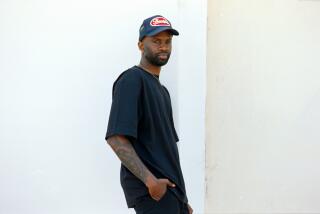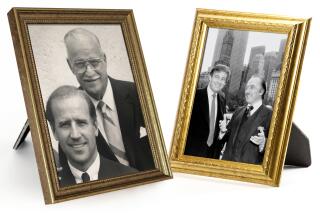Full-Time, Stay-at-Home Dad Says Fathers Need Respect, Too
- Share via
Hogan Hilling asks a good question.
What is fatherly love, exactly? We have a culturally shared understanding of “motherly love,” but fatherly love? The image does not leap as easily to mind.
Hilling wants to change that, to which I say, “Good luck,” believing that the only obstacle in his way is the entire recorded span of human behavior.
Hilling is not nearly as pessimistic. As proof, he offers up the tale of Hogan and the Moms at the Doughnut Shop.
About three years ago, having ended a break-even business and unsure of his next step, Hilling became a full-time, stay-at-home father, while his wife, Tina, became the sole financial provider in her job as a speech therapist with the Irvine Unified School District. The Hillings had two sons then and have since added a third. Complicating Hilling’s task is that 5-year-old Wesley has Angelman’s Syndrome, a severely disabling developmental condition.
At home alone in Irvine with the boys, Hilling dived into being a father, having grown up without one himself. And so, one morning he was out with Wesley and came upon some moms having coffee outside a doughnut shop.
He was familiar with the turf: Mom’s Turf. Yes, he was the stay-at-home caretaker for his children, just as they, but he wasn’t a mom. He wondered whether it would be like other situations, such as at PTA or other parent groups, where if he showed up alone with the kids, the women who dominated the attendance left him feeling, well, like a man.
“I don’t think this is any different than women coming into a men’s club,” he says. “I felt like I was prey to a group of lionesses that were surrounding me. Women are shocked (to see a man at something like a school function), so it created some very uncomfortable situations, and I see this happening to other fathers who come to PTA meetings or push strollers or carry diaper bags. You feel somewhat embarrassed, because it’s abnormal. People notice it, and mothers haven’t found ways to help men feel comfortable about fatherhood.
“What has happened is that there’s a kind of gender war going on out there. You’ve got mothers saying, ‘Look at all the deadbeat dads’ and there’s nothing but negative comments. . . .”
So, Hilling would sit in the midst of the den, whether at school or outside the doughnut shop, and feel like he had to prove himself as a parent.
“At first, I was frustrated and had a lot of resentment,” he says. “I find humor in it now. It was more of a look from them, a feeling. Sometimes I think it was more so whenever I tried to make comments about the way I nurtured the boys, because if I did it differently than they did, they assumed I was wrong and they saw no value in what I had to say. I felt like as much as they said they wanted their husbands to participate, another part of them said, ‘Hey, this is our turf, we don’t want you here.’ I was kind of disturbed because I felt like I was being pulled from both ends.”
The happy conclusion to the doughnut shop group is that he is a welcome member and it’s part of his routine. At first, they called him “Mr. Mom” when they saw him coming, “but I straightened that out,” Hilling says. “I told them I didn’t want to be Mom. I want to be a Dad. I don’t want to impose on their nurturing territory. I want to create my own identity. So I asked them to call me ‘Mr. Dad.’ ”
He learned they didn’t just talk about “mom stuff” or “women stuff.” They discuss whatever, but when the conversation inevitably turns to children, Hilling has found a much-needed haven for discussing his successes and challenges with his three boys.
Hilling, 39, has become passionate about fathering, which to him means how men, women and society can all contribute to helping men do it better. In a society where many fathers don’t even know what subjects their children are taking, much less their grades, it’s a mighty task.
There isn’t enough space here to talk about societal or self-imposed pressures on men to succeed in business. Too often, they forfeit fatherhood because of it.
I asked Hilling what he’s learned from his contact with mothers. “What I learned from the lionesses’ den was a respect for motherhood and respect for my wife. Part of it was the virtue of the task itself (of raising children), but it also was that part of me was trying to create some value for what I was doing as a father. I was being very selfish in thinking my family needed to respect me first, when it was the other way around. I needed to show respect for my wife and children before I could expect to be respected as a valued member of the family.”
Behind their bravado, many men want to be better fathers, Hilling says. They just need help. So while he gets miffed at men who don’t back up their claims to wanting to be better fathers, he has a suggestion for wives, too.
“Let me put it this way,” he says, “I think as much as women have asked fathers to understand motherhood, they haven’t done enough to understand fatherhood.”
Dana Parsons’ column appears Wednesday, Friday and Sunday. Readers may reach Parsons by writing to him at The Times Orange County Edition, 1375 Sunflower Ave., Costa Mesa, Calif. 92626, or calling (714) 966-7821.






